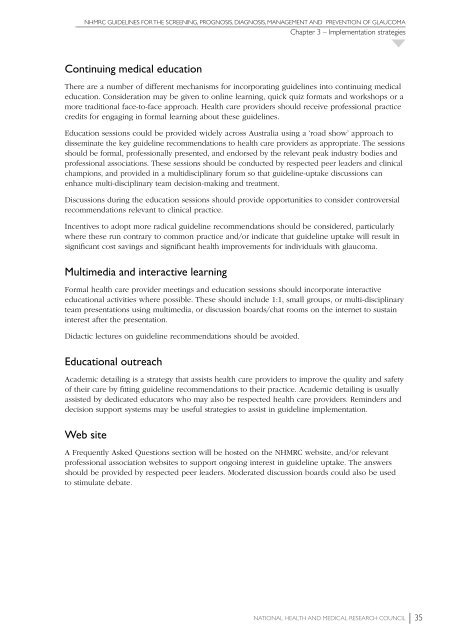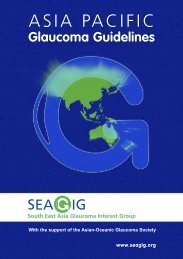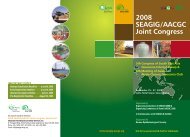NHMRC Glaucoma Guidelines - ANZGIG
NHMRC Glaucoma Guidelines - ANZGIG
NHMRC Glaucoma Guidelines - ANZGIG
Create successful ePaper yourself
Turn your PDF publications into a flip-book with our unique Google optimized e-Paper software.
<strong>NHMRC</strong> GUIDELINES FOR THE SCREENING, PROGNOSIS, DIAGNOSIS, MANAGEMENT AND PREVENTION OF GLAUCOMA<br />
Chapter 3 – Implementation strategies<br />
Continuing medical education<br />
There are a number of different mechanisms for incorporating guidelines into continuing medical<br />
education. Consideration may be given to online learning, quick quiz formats and workshops or a<br />
more traditional face-to-face approach. Health care providers should receive professional practice<br />
credits for engaging in formal learning about these guidelines.<br />
Education sessions could be provided widely across Australia using a ‘road show’ approach to<br />
disseminate the key guideline recommendations to health care providers as appropriate. The sessions<br />
should be formal, professionally presented, and endorsed by the relevant peak industry bodies and<br />
professional associations. These sessions should be conducted by respected peer leaders and clinical<br />
champions, and provided in a multidisciplinary forum so that guideline-uptake discussions can<br />
enhance multi-disciplinary team decision-making and treatment.<br />
Discussions during the education sessions should provide opportunities to consider controversial<br />
recommendations relevant to clinical practice.<br />
Incentives to adopt more radical guideline recommendations should be considered, particularly<br />
where these run contrary to common practice and/or indicate that guideline uptake will result in<br />
significant cost savings and significant health improvements for individuals with glaucoma.<br />
Multimedia and interactive learning<br />
Formal health care provider meetings and education sessions should incorporate interactive<br />
educational activities where possible. These should include 1:1, small groups, or multi-disciplinary<br />
team presentations using multimedia, or discussion boards/chat rooms on the internet to sustain<br />
interest after the presentation.<br />
Didactic lectures on guideline recommendations should be avoided.<br />
Educational outreach<br />
Academic detailing is a strategy that assists health care providers to improve the quality and safety<br />
of their care by fitting guideline recommendations to their practice. Academic detailing is usually<br />
assisted by dedicated educators who may also be respected health care providers. Reminders and<br />
decision support systems may be useful strategies to assist in guideline implementation.<br />
Web site<br />
A Frequently Asked Questions section will be hosted on the <strong>NHMRC</strong> website, and/or relevant<br />
professional association websites to support ongoing interest in guideline uptake. The answers<br />
should be provided by respected peer leaders. Moderated discussion boards could also be used<br />
to stimulate debate.<br />
National Health and Medical Research Council 35





